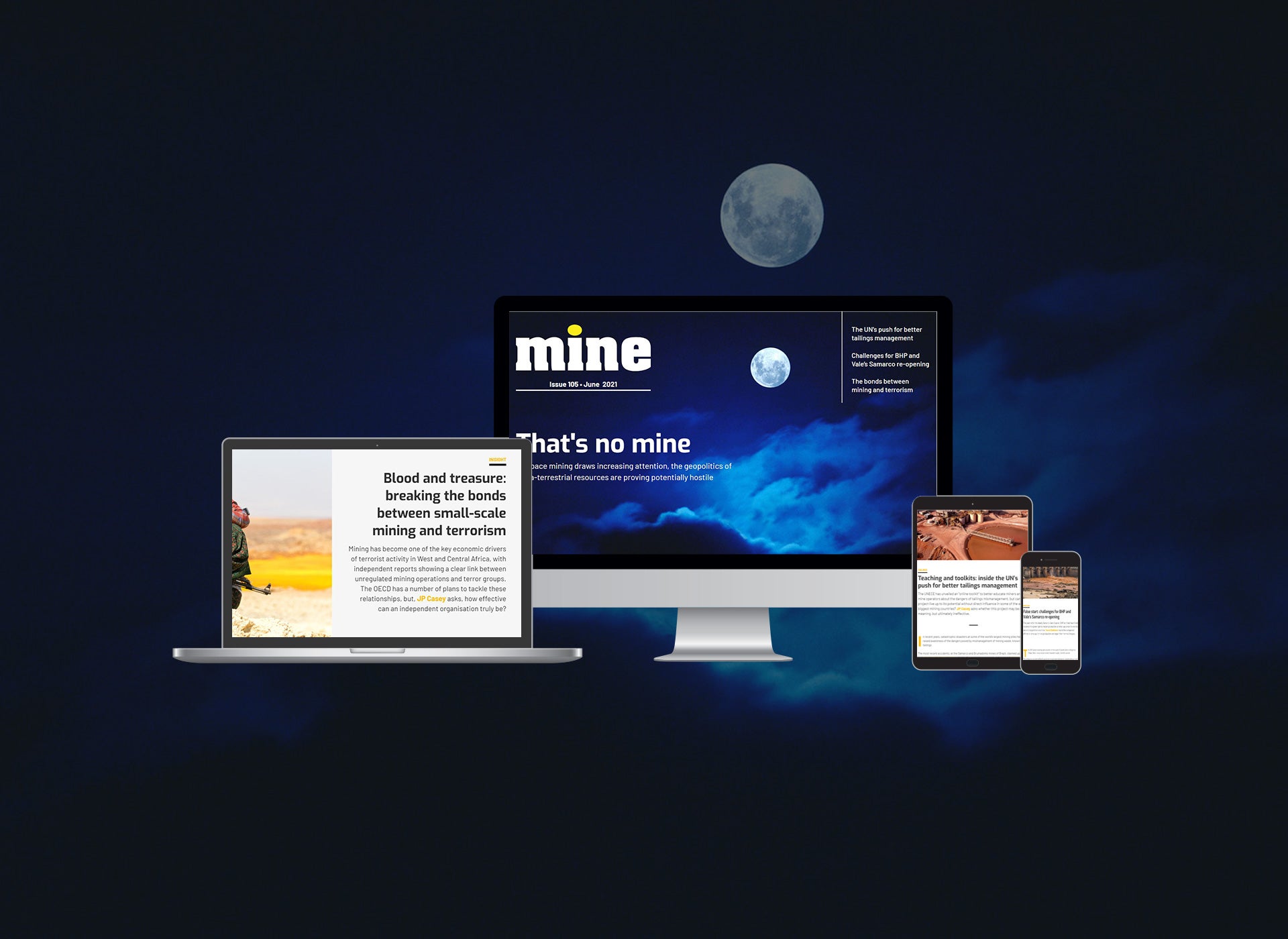
Experts have warned that conflict could be brewing in space as China and Russia look to stem the US’s attempts to dominate extraterrestrial commerce. With attention increasingly being paid to space-based resources, we look at the geopolitical dimension of space mining and what the future may hold.
Also, the UN’s European division has unveiled an “online toolkit” to better educate miners and mine operators about the dangers of tailings mismanagement, in the wake of a series of disastrous tailings accidents around the world. However, questions remain about the efficacy of awareness-raising in the aftermath of disasters with such tangible consequences, and the fact that the UN’s programme is centred on a part of the world where mining is no longer a key economic driver, and has not seen accidents on the scale of those in Brazil.
Elsewhere, mining has become one of the key economic drivers of terrorist activity in West and Central Africa, with reports from the Financial Action Task Force and Brookings showing a clear link between unregulated mining operations and terror groups. This relationship obviously poses security risks in the countries where these groups operate, but also places artisanal and small-scale miners under a unique, and at times deadly, form of pressure, with violent groups at times the only people willing to purchase their goods. We investigate these relationships, and ask: what is to be done?
Whether you are on a desktop, tablet or smartphone, you can read the magazine for free online, and join the conversation on Twitter.

In this issue
Stay gold: Egyptian ambition and investment
After years of stalled gold mining progression, Egypt’s new mining regulations have opened the door to new investments and attracted the interest of Egyptian billionaire Naguib Sawiris, who is investing in the country’s gold ambitions. With gold mining in the country stretching back to the era of pharaohs, Yoana Cholteeva takes a look at the sector’s increasing momentum.

In space, no one can hear you mine: NASA’s blueprint for space mining
Experts have warned that conflict could be brewing in space as the US and its allies work to pre-emptively dominate extra-terrestrial commerce. With attention increasingly being paid to space-based resources, Matthew Hall looks at the geopolitical dimension of space mining and what the future may hold for private space enterprises.

Teaching and toolkits: inside the UN’s push for better tailings management
The UNECE has unveiled an “online toolkit” to better educate miners and mine operators about the dangers of tailings mismanagement, but can this project live up to its potential without direct influence in some of the world’s biggest mining countries? JP Casey asks whether this project may be well-meaning, but ultimately ineffective.

False start: challenges for BHP and Vale’s Samarco re-opening
Five years after the deadly Samarco dam disaster, BHP and Vale have finally received the green light to restart production at what was once the world’s second-largest iron ore mine. Yoana Cholteeva tracks the companies’ efforts to ramp up iron ore production and repair their harmed images.

Blood and treasure: breaking the bonds between small-scale mining and terrorism
Mining has become one of the key economic drivers of terrorist activity in West and Central Africa, with independent reports showing a clear link between unregulated mining operations and terror groups. The OECD has a number of plans to tackle these relationships, but, JP Casey asks, how effective can an independent organisation truly be?

How satellite images of illegal mining can force action on the ground
Projects that monitor the extent of illegal mining and deforestation in the Amazon are now able to provide near-real time satellite images showing the scale of damage. Matthew Hall explores how these projects are able to instigate action on the ground and looks at the barriers that NGOs and researchers face in turning often shocking images into actual change.

Preview – MINE Magazine July 2021
A new project developed at Kazakhstan’s Nazarbayev University’s Institute for Smart Systems and Artificial Intelligence, may improve the safety of miners underground. The new technology could determine the location of miners based on an algorithm of available Wi-Fi spot signals and inertial measurement unit sensors. We find out more.
Also in this issue, we look at how Greenland is developing its mining sector and how foreign governments are trying to establish themselves in the country. In addition, we speak with three experts to learn more about the workplace challenges many female miners encounter while securing their livelihood.
Plus, we look at what growing resource nationalism could mean for miners, explore the challenges faced by America’s coal-producing regions, and ask whether mining companies are ever likely to prioritise social wellbeing over economic interest?



